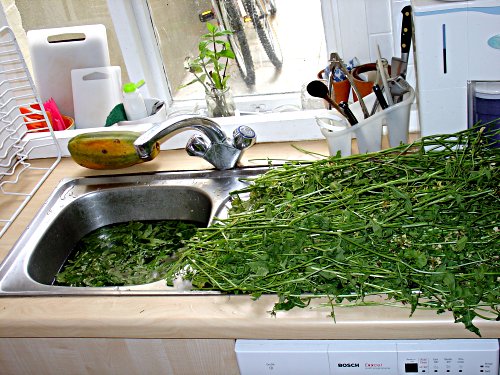Txtonymy
La saisie intuitive, prisée sur les téléphones portables, peut donner des résultats déroutants, pas intuitifs du tout.
En ce qui me concerne, moi, j’ai trop de salade à la maison.
My landlady here in London — I’m renting her spare room while looking for a more permanent place — left for a week-long business trip early this morning. So I wasn’t surprised to find a message from her with last-minute instructions. Understanding it, however, posed an unexpected problem.
The first half of the message was clear enough — an invitation to help myself to any vegetables left in the kitchen. Very nice. The second part, though, read as follows:
Pocket go big bag on kitchen floor can be pulled off stems and 10 mins soak go cold water will revive it
My esteemed readers are probably just as baffled as I was. But I had two or three additional pieces of information at my disposal which, after a minute’s contemplation and a search of the kitchen floor, allowed me to unravel the mystery:
- My landlady is a native speaker of English and an editorial writer by profession.
- She is an avid gardener and very much into fresh home-grown food.
- The message arrived via SMS (”text message”) on my mobile (AmE: cell) phone.
From 1. we conclude that this was not another case of wood flower picks sea cucumber hoof, but simply the result of her being in a hurry.
Number 2 confirms or at least suggests that the topic of the message was garden vegetables (as opposed to, say, voodoo).
Finally, 3. sends us on the right track as to what went wrong. Indeed, over here in the UK, most mobile phones are equipped with predictive text input systems, T9 and the like. And these systems are usually rather crudely based on global word frequencies, without taking context into account. I’ve noticed myself that whenever I’m texting “me”, my own (Nokia) phone will invariably prefer “of”. And the other day, I nearly replied to a text inquiring about my whereabouts saying that I was “at H&M buying rocks”. (Do people really text so much about rocks?)
So “go” isn’t “go” at all — it’s “in”! Furthermore, the key with the letter P also houses Q, R and S. And wouldn’t you have thought it, under the kitchen table there was a carrier bag filled with a huge bunch of rather sorry looking greenery. Resolving two textonyms was all it took.
I’m typing this from the kitchen table — three cheers for wireless broadband — while the rocket (also called arugula or rugola, French: roquette, German: Rauke or Raukelkohl, Italian: rucola, ruccola, ruchetta or rughetta) is recovering in the sink. Here’s a photo of the revivification process about a third way through:

Enough salad to feed an army. Not to mention the other huge bag full of Swiss chard (French: blette, German: Mangold). I think I need a recipe.
Oh, and does anyone have an idea what that exotic fruit to the left of the tap might be, and how to prepare it? It doesn’t look like it’s going to survive the week either…
[The spell-checker didn’t know: texting and textonym; and it’s indeed arugula, not jugular.]
Related posts: Mon pin's est greenz, Apostrophe, Nouns and verbs on #wordpress, London signage 01: And the plural would be "scalves"?, Sappho II, Show me your vowels!, Amuse-bouche to zaibatsu
Technorati (tags): gadgets, language, mobile phones, predictive text, saisie intuitive, salad, SMS, spelling, textonym


Carambola, maybe? better known as Star Fruit.
yummy. very sweet.
that looks like a papaya to me
It is, indeed, a Papaya. I took the big knife on the right to it, and am now cutting it up to throw it into the juicer.
Yummy rocket that is.
In German it is also called “Rucola”, not so often “Ruccola”, and not so often “Rauke” any more (just like “Pasta” and “Nudeln”, and similar to “kiwifruit” and “Chinese gooseberry”).
Remeber what they say about nitrate in rocket…
I would be inclined to braise or steam the Swiss chard and finish it off by melting cheese over it. Or you could try a Google groups search.
Yes, Rukola here.
That’s undoubtedly Papaya!!!
Yes, it’s papaya, I believe. Just thank your lucky stars you don’t have to deal with gobo (that’s either cooking it or eating it). Free Safeway Tesco vouchers for anyone who knows where gobo comes from. And no, it isn’t Tesco…
This species is native to the temperate regions of the old world, from Scandinavia to the Mediterranean, and from the British Isles through Russia, and the Middle East to China and Japan, including India. It is naturalized almost everywhere and is usually found in disturbed areas, especially in soil rich in nitrogen.
Was used during the Middle Ages as a vegetable, but now it is rarely used, with the exception of Japan where is called gobo (牛蒡 or ゴボウ) as well as in Italy and Portugal, where it is known as bardana